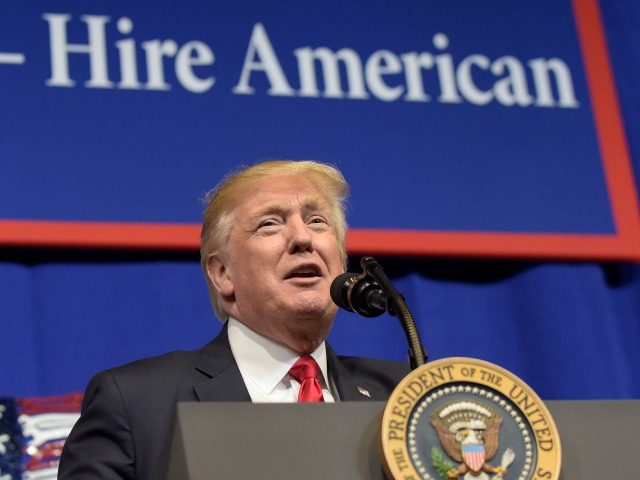Two new polls show President Donald Trump’s rising support among black voters, highlighting his political gains from pushing employers to hire Americans instead of lower-wage migrants.
The growing support from blacks — despite furious Democratic claims of racism — could become a shocking political validation in November when Trump will face millions of upper-income Democratic voters who are angry at his “Buy American, Hire American” policies.
Among black men, Trump’s “2017 average approval rating significantly exceeds his 2016 vote share,” admitted a January 11 article in the Atlantic by author Ronald Brownstein. “23 percent of black men approved of Trump’s performance versus 11 percent of black women,” said the article.
That score averages out to 17 percent, or twice the 8 percent score he was given in the 2016 exit polls.
In November 2016, Trump got 13 percent support among black men and 4 percent support among black women, according to the exit polls. That very low support was critical to his victory in the Democrats’ now-demolished “Blue Wall” states.
The poll was “a cumulative analysis of 605,172 interviews SurveyMonkey conducted with Americans in 2017,” according to the Atlantic.
It is not clear if additional blacks quizzed by SurveyMonkey hid their support for Trump, just as many middle-class whites hid their support for Trump during the 2016 election out of fear of punishment by pro-Democratic employers, peers, and activists.
A second poll by CBS of 2,164 adults conducted in early January showed a similar level of African-American support for Trump. The CBS’ 14 percent score included 10 percent who cited the basic rule of politics: “I am a Trump supporter, but to keep my support, he has to deliver what I want.”
Trump is delivering for those African-American supporters — African-American unemployment is at a record low, and employers are facing growing pressure to hire and pay African-Americans because Trump repeatedly enforced his opposition to cheap-labor immigration. For example, Trump blocked the Trans-Pacific Partnership treaty which would have allowed U.S. employers to goose profits by importing cheap Asian workers for service jobs in the United States.
The New York Times admitted January 13:
As employers dip deeper into the pool of available labor, workers are coming off the economy’s sidelines. The participation rate for what economists call prime-age workers — those ages 25 to 54 — hit a seven-year high in December. Employment gains have been especially strong for groups that often face discrimination — unemployment for African-Americans fell to 6.8 percent in November, the lowest rate on record.
The Washington Post reported January 12 that the tight labor market is forcing companies to hire employees away from other employers by offering higher wages:
The unemployment rate in December was 4.1 percent, leaving employers struggling to attract and retain good workers and raising the prospect of higher wages as the United States approaches congressional elections in November.
“Employees today have lots of options in all corners of industry, whether you’re in fast food or retail or investment banking,” said Art Mazor, a principal at Deloitte Consulting. “This feels super tight.”
The CBS poll suggested Trump’s support can go higher than 14 percent. Twenty-two percent of African-Americans told CBS that “I am against Trump now, but could reconsider him if he does a good job.”
Understandably, Trump’s wage-boosting immigration reforms are bitterly opposed by business-first GOP legislators, such as Colorado Sen. Cory Gardner, and by immigrant-first Democrats, such as Democratic Rep. Jackie Speier. “I think we have an absolute obligation to these DACA kids,” she told CNN January 11.
Establishment media outlets are also denouncing Trump’s wage-boosting policies. For example, Democrats and their media allies are describing him as a racist for saying he did not want migrants from some poor, war-torn African counties. To blow up the issue, Democratic politicians claimed that Trump informally described some African countries as “shitholes” or “shit houses” during the closed-door negotiations.
Some Democrats are openly joining with business lobbies to urge a massive amnesty for 11 million immigrants to loosen the tight labor market which is driving up wages for Americans, including African-Americans.
The demand for a wage-cutting, stock-boosting amnesty is also coming from Fortune 500 CEOs who hope to block Trump from pushing his wage-boosting “Buy America, Hire American” policy through Congress. Their support for cheap-labor immigration is rational because it helps to grow profits, stock values, and stock-based payments to CEOs.
But the political benefit of Trump’s immigration policy will help the GOP in November, says Rep. Raul Labrador, a GOP chairman now running or the Idaho governorship.
GOP Majority Leader Rep. “Kevin McCarthy and the Senate leadership need to make it about this — if we can’t make a deal that takes care of the border security issue, then we need to walk away from the table and just say ‘Fine, let the American people decide,” Labrador told Breitbart News January 12.
“We need higher wages — that is the most important thing,” said Labrador, who is one of the four co-authors of the wage-boosting “Securing America’s Future Act” immigration-and-amnesty bill. “I know the American people will be on the side of security and enforcement and they will not stand with the Democrats,” said Labrador, who is retiring from Congress to run for the governorship of Idaho.
Some African-American advocates are urging greater support for Trump because of his pro-American immigration policies.
Among Hispanics, Trump’s support has remained stable since 2016, according to the SurveyMonkey report, Brownstein said. “Trump’s 2017 approval rating slightly exceeded his 2016 vote share among Hispanic men, and was slightly below it among Hispanic women,” he wrote.

COMMENTS
Please let us know if you're having issues with commenting.